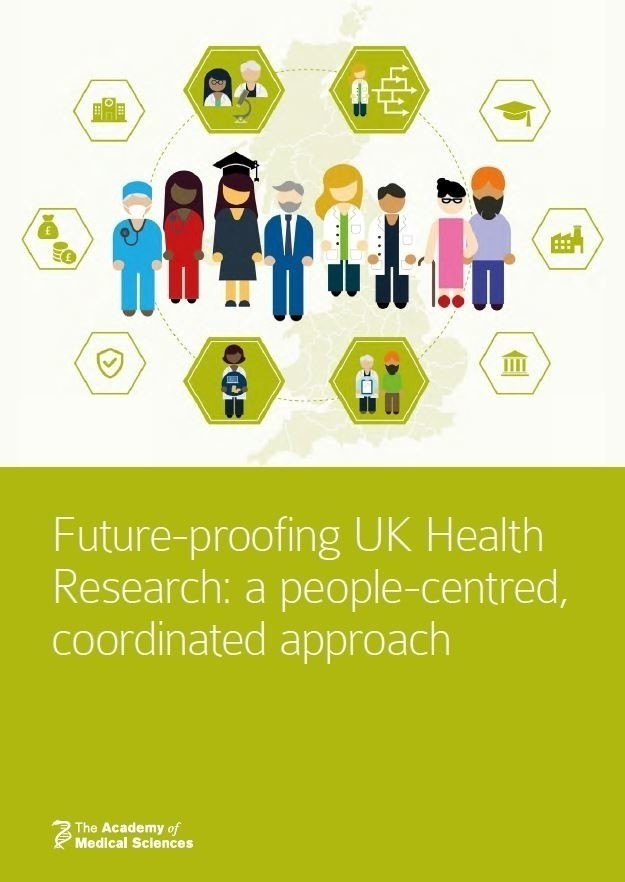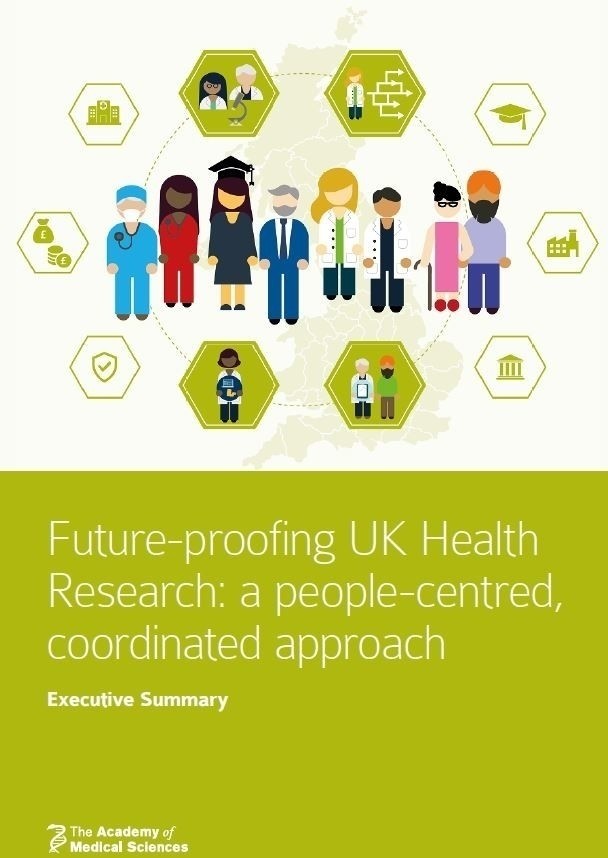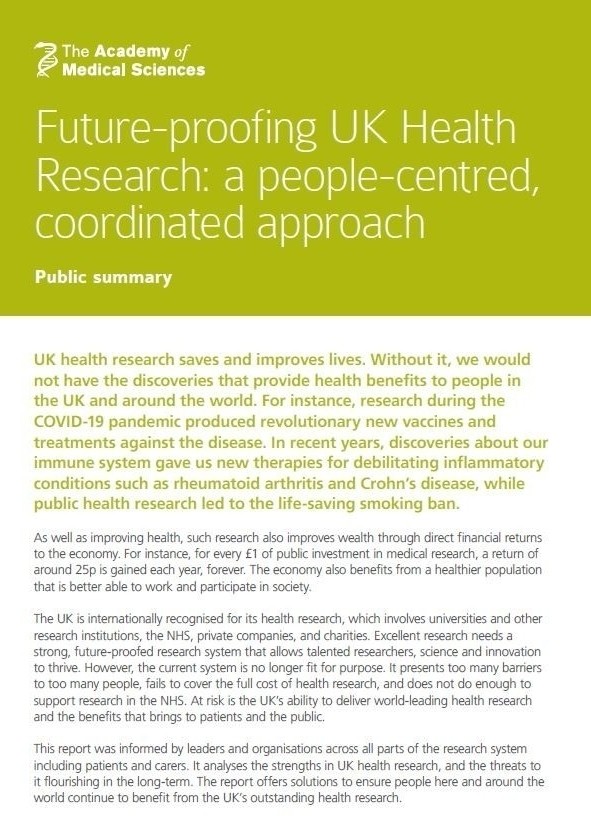Act now to stop the UK from losing our exceptional strengths in health research, and the value it brings to society, says new Academy of Medical Sciences’ report.
Published today, ‘Future-proofing UK Health Research: a people-centred, coordinated approach’, details key threats to UK health research and the steps needed to protect it.
Health research saves and improves lives, for example by producing world-renowned breakthroughs such as sequencing the human genome and developing life-saving vaccines. It also drives the economy; every £1 of public investment in medical research delivers a return equivalent to around 25p each year, forever (1).
To secure a sustainable future for research and deliver maximum health benefits for people everywhere, the report calls for coordinated action. This involves Governments across the UK, public and charitable funders, higher education institutions, industry, NHS leaders, patients, carers and the public. It concludes that UK health research is in danger of being taken for granted and sets out what needs to be done to improve and future-proof it.
The report was produced by 30 experts from across the UK, including established and emerging research leaders, patients, carers and representatives from the public, private and charitable sectors. Chaired by Professor Dame Julia Goodfellow FMedSci and Professor Sir Peter Mathieson FRSE FMedSci, the group analysed the strengths in the health research system and identified factors which threaten the UK’s ability to deliver health and economic benefits in the long term.
The report’s key findings are:
- We must place people at the heart of the UK health research system. Research culture and career structures can be narrow, inflexible, precarious and exclusive, undermining the ability of diverse individuals, including patients, and those with broad expertise to fully explore their potential and deliver innovations.
- We must maximise the research potential of the NHS, which currently struggles to make health research part of the norm.
- We must ensure that the true cost of excellent health research is adequately covered, to address a funding model which relies on cross-subsidy from international students as the total cost of research in universities is not covered by any funder (2).
- We must ensure talented people can develop careers that span sectors to address a lack of movement of researchers between roles in public, private and charitable research sectors.
Professor Sir Peter Mathieson FRSE FMedSci, Fellow of the Academy of Medical Sciences and co-Chair of the report, said: “Our report is a wake-up call. Despite the weighty evidence of the value excellent health research brings to society, we risk losing the benefits. At a time where we face health challenges such as pandemics and climate change, we cannot be complacent.
“This report is as much directed at me as it is at NHS boardrooms and industry leaders: there are actions I will be taking, as Principal of the University of Edinburgh and lead member for Health for Universities Scotland.”
Professor Dame Julia Goodfellow FMedSci, Fellow of the Academy of Medical Sciences and co-Chair of the report, said: “The UK’s life science and health research base is strong, but the system supporting it is fragile. If left untended, our health research system will continue to fray at the edges, leaving it in a poor position to provide health, wellbeing, and economic benefits.
“With the klaxon sounded, it is clear we need a coordinated and people-centred movement now to strengthen the life-saving asset that is our health research system.”
To address the threats to the health research system, the report details a range of solutions with actions for organisations across the sector.
The vital role of the NHS
To capitalise on the potential within our over-burdened healthcare system, NHS bodies across the UK must make research a core part of their business plan, and an essential part of clinical care. Recent reports show the number of patients taking part in industry-backed clinical trials has fallen by 44% between 2017/18 and 2021/22 (3). The NHS, regulators, funders and universities should work together to support clinical academics (doctors, nurses and other healthcare professionals who conduct research). This should include improving the support for our clinical academics and piloting a scheme where healthcare professionals have protected time for research.
Dr Rasha Al-Lamee, who contributed to the report, spends 70% of her work-life running clinical trials on how to relieve the symptoms of heart disease and 30% of her time seeing patients.
Dr Rasha Al-Lamee, Clinical Senior Lecturer at National Heart and Lung Institute, Imperial College London, and cardiology consultant at Imperial College Healthcare NHS Trust, said: “For me, being a clinical academic is a privilege, with the benefits extending far beyond my own job satisfaction to the patients I treat and work with and the culture of my workplace. The rewards don’t stop there – hospitals doing research have better patient outcomes overall. Despite this, there has been a decline of almost a quarter of the number of clinical academics at my career level across the UK over the last decade (4). To avoid detrimental effects on patients and healthcare workers like me, the sector needs to make it easier to hold these dual careers in a secure and flexible way.”
Research culture and careers
Funders and employers should address the fragility and inflexibility of research careers through shared commitments on researcher salaries, contracts and grant applications. Government, funders and regulators must remove barriers to attracting global talent by addressing visa applications and immigration costs and improving the recognition of international qualifications. Public and charitable funders should increase the inclusivity of health research careers by applying evidence-based strategies on equity, diversity and inclusion. All funders should embed patient and public involvement throughout health research, providing consistent and fair remuneration alongside funding allocations for meaningful patient and public involvement at all stages of research.
Sarah Rae, a patient researcher with lived experience of mental health, and co-Chair of the report’s Patient and Carer Reference Group, said: “The health research system neglects to meaningfully involve patients and carers, who bring unique insights. Funders, universities, and the NHS should create opportunities for patients and carers to become integrated in all stages of research, specifically from the very beginning of the process, in all areas and at every level of decision-making. I hope that the entire health research system acts together to ensure patients and carers become equal partners in research.”
Professor Dame Anne Johnson PMedSci, President of the Academy of Medical Sciences, said: “A thriving research sector demands a varied and collaborative workforce where leaders of the future are nurtured and encouraged to realise their curiosity and ambition for research and innovation. With a coordinated effort, the UK’s health research system will flourish and overcome the threats to it, but only if everyone takes charge of the areas they have the power to future-proof.
“Over the next six months, the Academy of Medical Sciences will bring together leaders across Governments, funders, universities, industry and the NHS to plan how to implement the findings of this report to secure a prosperous health research system.”
-ENDS-
This report was covered by BBC Radio 4's flagship Today Programme (listen back here, from 51m47s) and in print news outlets including The Lancet, The Independent, Irish News, the Express and Star and Research Professional.
For more information and requests for interview please contact: Naomi Clarke, Media and News Manager, Academy of Medical Sciences, 07944 023132, [email protected]
References
- Wellcome Trust, et al. (2018). Medical research: What’s it worth? A briefing on the economic benefits of musculoskeletal disease research in the UK. https://acmedsci.ac.uk/file-download/54792223
- Between the academic years 2010-11 and 2019-20, the percentage of full economic costs of research covered by research income has decreased from 78% to 70%. Publications - Office for Students (accessed March 2022). [ARCHIVED CONTENT] Archive - Higher Education Funding Council for England (nationalarchives.gov.uk) (accessed March 2022). P. 66, ‘Future-proofing UK Health Research: a people-centred, coordinated approach’ acmedsci.ac.uk/future-proofing-research
- Recent data from an ABPI report on ‘rescuing patientaccess to industry clinical trials in the UK’ demonstrate that patient access to industry research on the NIHR CRN has fallen by 44% between 2017/18 and 2021/22 (from over 50,000 participants to less than 30,000).Reference(s): Association of the British Pharmaceutical Industry (2022). Rescuing patient access to industry clinical trials in the UK. https://www.abpi.org.uk/publications/rescuing-the-uk-industry-clinical-trials/
- There has been a 22.7% decline in the numbers of clinical academics at Reader/Senior Lecturer level across the UK over the last decade https://www.medschools.ac.uk/clinical-academic-survey
Notes to editors
- The Academy of Medical Sciences is the independent, expert voice of biomedical and health research in the UK. Our Fellowship comprises the most influential scientists in the UK and worldwide, drawn from the NHS, academia, industry, and the public service. Our mission is to improve the health of people everywhere by creating an open and progressive research sector. We do this by working with patients and the public to influence policy and biomedical practice, strengthening UK biomedical and health research, supporting the next generation of researchers through funding and career development opportunities, and working with partners globally.
www.acmedsci.ac.uk @acmedsci Facebook, LinkedIn, Instagram
- The project was supported by a core grant the Academy received for policy work from the Department for Business, Energy and Industrial Strategy (BEIS), now the Department for Science, Innovation and Technology (DSIT), but was carried out independently of Government.
- A full list of the report Working Group can be found here. The evidence for this report was gathered via a range of sources, including a call for written evidence, five evidence-gathering workshops and roundtables, a series of public dialogue sessions run by Ipsos Mori in May 2022 and desk-based research.
- Biographies of the report co-Chairs
Professor Dame Julia Goodfellow FMedSci
Julia Goodfellow has been a fellow of the Academy of Medical Sciences since 2001 and has served on Council. She studied Physics as an undergraduate but soon moved into biophysics and structural biology. After a postdoctoral fellowship at Stanford University, she moved to Birkbeck, University of London, eventually becoming Vice-Master. In 2002, she was appointed Chief Executive of the BBSRC and in 2007 she moved to University of Kent as Vice-Chancellor. During this time, she served as a member of the Prime Minister’s Council for Science and Technology and was elected the first woman President of Universities UK in 2015. Since leaving Kent, she has undertaken a number of non-exec positions including chair of Public Health England and President of the Royal Society of Biology. She is currently President of The Biochemical Society, on the Council of the Open University and a trustee of HEPI. She received a CBE in 2001 and a DBE in 2010.
Professor Sir Peter Mathieson FRSE FMedSci
Peter Mathieson has been a Fellow of the Academy of Medical Sciences since 1999. He qualified in Medicine in London with First Class Honours in 1983, specialised in Renal Medicine and studied for a PhD in Cambridge which was awarded in 1992. He became the Foundation Professor of Renal Medicine in Bristol from 1995, was elected as the President of the Renal Association and appointed as the founding Director of Bristol Health Partners. His last 6 years in Bristol, 2008-14, were as Dean of the Faculty of Medicine and Dentistry. In 2014 he emigrated to become President of The University of Hong Kong. In 2018 he commenced his present role as Principal of the University of Edinburgh. He is a Fellow of the Royal Society of Edinburgh and of the Royal Society of Arts. He was knighted in the 2023 New Year Honours for services to higher education.


